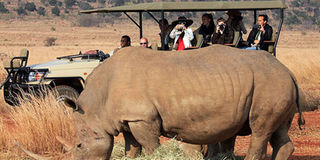Namibia defends black rhino hunt

Tourists on a game drive in Entabeni game reserve in South Africa. PHOTO | CHRISTOPHE BEAUDUFE | FILE
What you need to know:
- The auction which ends on Saturday will be followed by a hunt at a Namibia national park
- Namibia is less affected by rhino poaching compared with its neighbour, South Africa, with only 10 killed since 2006
WINDHOEK
Namibia wildlife authorities on Friday defended the auction of permits to hunt black rhino, saying the kill was aimed at conserving the endangered species.
The auction conducted in the United States by The Dallas Safari Club is part of a government approved annual quota, in place since 2012. It gives permission for the killing of five black rhino per year.
"We have been confronted by individuals and organisations who express their dissatisfaction about the programme... They sometimes think that we do things randomly," said Deputy Environment Minister Pohamba Shifeta.
"People should not be worried, we have a programme and policies that we are following."
Shifeta said the auction which ends on Saturday will be followed by a hunt at a national park in the semi-desert southern African country that has a black rhino population of nearly 1,800.
DEATH THREATS
Dallas Safari Club director Ben Carter said he has received more than a dozen e-mailed death threats against his family and members of his staff.
"It is some pretty crazy stuff," he told NBC News.
"A number of the emails said, 'For every rhino you kill, we will kill a member of the club'."
The Texas-based club sought help from the Federal Bureau of Investigation, which told AFP it is taking the threats "seriously."
"If something is found to violate (federal) law we'll conduct additional investigation as needed," said Katherine Chaumont, spokeswoman for the FBI's Dallas office.
"But certainly local police could have jurisdiction as well."
The safari club expects the auction to generate $250,000 to $1 million and that the funds will be used for rhino conservation efforts.
Carter defended the hunt in a press release last week in which he insisted that it will help increase the size of the herd by removing an old "post-breeding" male which is "known to kill younger bulls, cows and even calves."
Namibia says proceeds from the hunt which has drawn widespread criticism from wildlife groups will go to a conservation fund.
"We have never experienced a reduction of rhinos, in fact, the number has increased," Shifeta said.
Namibia is less affected by rhino poaching compared with its neighbour, South Africa, with only 10 killed since 2006, according to the international wildlife trade monitoring network Traffic.
Across the border in South Africa, rhino poaching has reached crisis levels, with nearly a thousand killed in 2012.
Black rhinoceroses are internationally considered an endangered species and the World Wildlife Fund says there are less than 5,000 rhino remaining in Africa.
The Namibian government also grants licences for the hunting of big game like elephant and lion.





